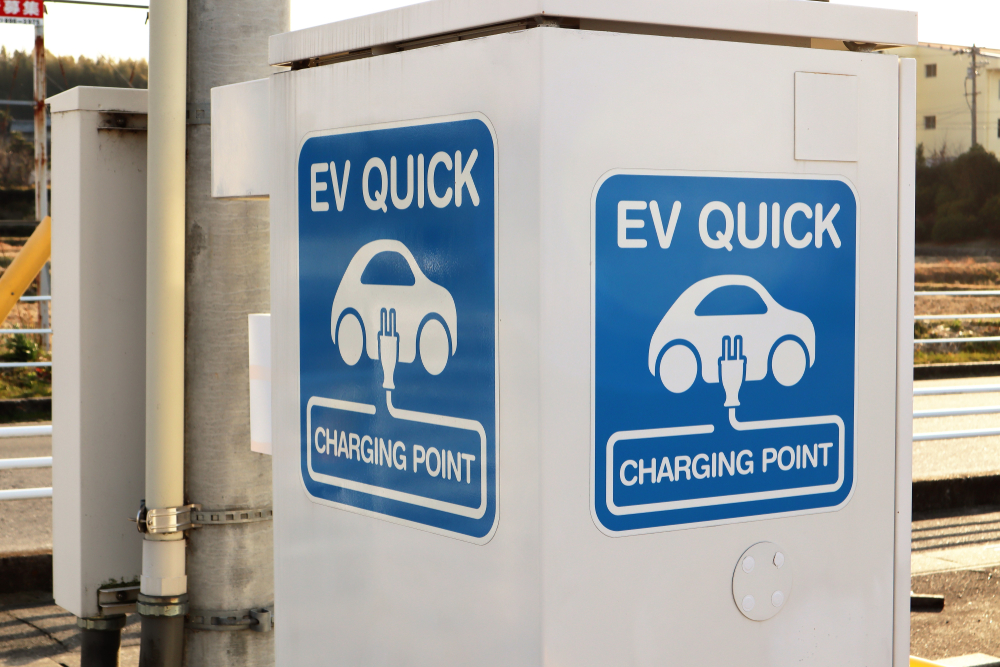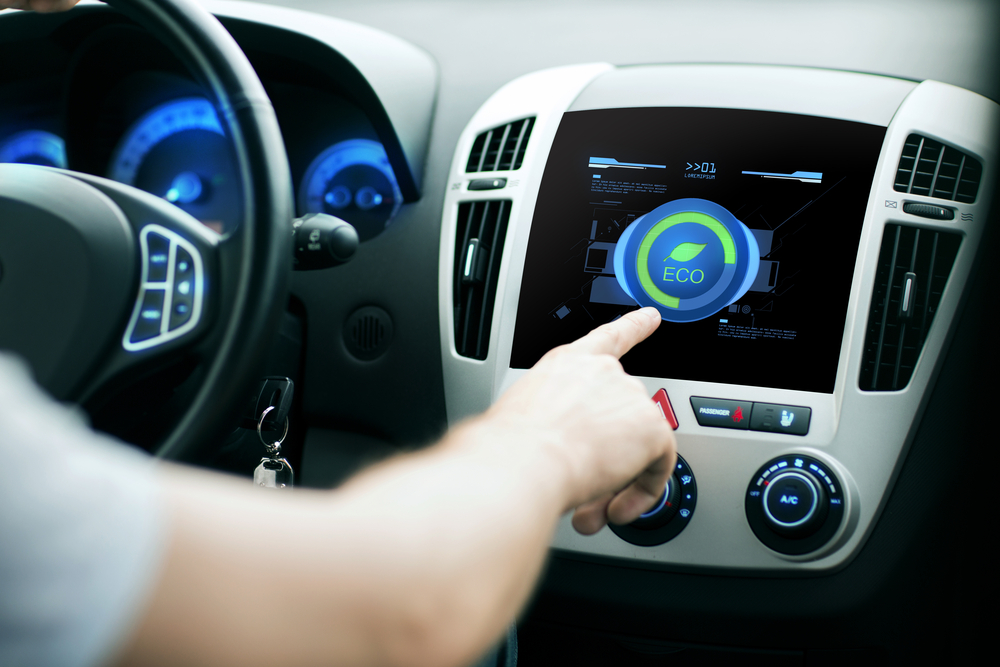
It seems like every car company is trying to sell a hybrid version of one of their cars. Hybrid cars offer the benefit of using less fuel because hybrids combine small gasoline engines with electric motors for power. Let's take a deeper look at the pros and cons of owning a hybrid car.
Advantages of Hybrid Cars
There are two main kinds of hybrid cars today, plug-in hybrid and hybrid. The primary difference is that plug-in hybrid (PHEV) cars use the electric motor for the main power. Hybrid cars rely on gasoline engines to charge the batteries. PHEV cars get better gas mileage than hybrids or gasoline-powered cars.
 EV Quick Charge stations are becoming more common.
EV Quick Charge stations are becoming more common.The major pro of owning a hybrid car is that owners can save money on fuel.
Disadvantages of Hybrid Cars
Standard hybrid and PHEV cars have drawbacks, also. Both types are built for fuel economy, so they tend to lack performance. Batteries eventually wear out and can cost a lot to replace. Since hybrids also have a gasoline engine, all the normal maintenance of a gasoline-powered car still applies. Owners will have to do oil changes and other services. The addition of an electric motor can make working on hybrid cars more complicated for the average owner.
Owners have to recharge PHEV cars. Charging at home is slow, about five miles of range per hour plugged in, and can raise household electricity costs quite a bit. Charging stations are becoming more common in urban American cities. Rural owners may find it inconvenient to charge at home.
 Turning on Eco mode is needed to save fuel, but reduces performance.
Turning on Eco mode is needed to save fuel, but reduces performance.A disadvantage many owners find when driving hybrid and PHEV cars is that in order to get good fuel mileage, the car must be driven slowly and steady, without a lot of stops or hard acceleration. Turning off accessories, like the radio, air conditioner, and lights improve fuel mileage. That can make the drive uncomfortable for occupants.
Is a Hybrid Car Worth Buying?
Car buyers interested in hybrid cars should shop carefully. There are many pros and cons to buying one. Buyers looking at used, older cars should be cautious.
They make the most sense for urban city living. Most PHEV cars have a short electric-only range. The average electric-only range for PHEVs sold in the US is 21 miles. There are 24 PHEV cars for sale as of May 2019.
Hybrid and PHEV cars can use the brakes and gasoline engine to charge the batteries.
Hybrid and PHEV cars cost more than gasoline-powered cars. A new PHEV can cost between $2,000 and $5,000 more than regular cars. Hybrid and PHEV cars can be more expensive to repair and maintain, also.
Recent research indicates hybrids reduce exhaust emissions between 10 and 20 percent over gasoline cars. Places were electricity is made by burning coal do not reduce emissions overall. Also, mining the rare-earth materials needed to make hybrid cars is very bad for the environment.
How Long do Hybrid Car Batteries Last?
Toyota claims the battery in a Prius will last the life of the car, or ten years, whichever comes first. Toyota recommends changing the battery after 150,000 miles. The battery can cost between $3,500 and $5,500 to replace. A ten-year-old Prius is worth about $4,000.
Three types of batteries are used in hybrid and PHEV cars. Lithium-Ion (Li-Ion) batteries, like cell phone batteries, are becoming common. Toyota uses both Li-Ion and Nickel Metal Hydride (Ni-MH) in hybrid cars. Older cars use lead-acid batteries like those in a regular car.
Li-Ion batteries last the longest, but cost the most to replace. Ni-MH batteries are the most common in hybrids but lose the ability to fully charge faster than Li-Ion. Lead-acid batteries are rarely used anymore because they are inefficient, heavy, and don't last long.
How Reliable is a Hybrid Car?
Consumer Reports determined that generally, hybrid cars are as reliable as their gasoline counterparts. Many of the top companies, like Toyota and Honda, have a sterling reputation for reliable cars. Their cars are no different. Many owners will drive a hybrid for years without any serious problems. California requires all hybrid cars to carry a 150,000-mile warranty. The pros and cons of owning a hybrid should involve looking at the reliability.
Repairs
Generally, the average home mechanic can perform most services on a hybrid with a high-quality service and repair manual for hybrid cars. Coolant changes can be more expensive and difficult for hybrid cars because the antifreeze is also used to cool the batteries that generate a lot of heat.
Brakes can wear out faster when drivers use them for regenerative braking. Hybrids tend to weigh more than gasoline cars, so shocks, struts, and bushings can wear out faster.
Batteries
Batteries will lose the ability to fully charge over time, just like a laptop or cell phone. Li-Ion batteries can cost more than the value of the vehicle to replace.
Insurance
Hybrid cars are also more expensive to insure. NerdWallet.com found that insurance costs can be nearly 12 percent higher for a hybrid over the gasoline-powered version.
Safety
The National Highway Traffic Safety Administration is responsible for crash-testing new cars. NHTSA has found that hybrid and all-electric cars perform better in crashes than gasoline cars. This is in part due to the way the batteries are held in the car. It provides a stronger backbone.
Hybrids that are involved in car accidents can be extremely expensive to repair due to the complex electric and gasoline engines and the array of sensors necessary. In many cases, minor accidents involving hybrids result in a total loss to the owner. Hybrid owners should have the best insurance they can afford in case of an accident.
The Environmental Impact of Hybrid Cars
 Electricity is produced by burning coal and fossil fuels, which produce pollutants like the ash field at this power plant.
Electricity is produced by burning coal and fossil fuels, which produce pollutants like the ash field at this power plant.Many people buy hybrid cars because they want to do the least damage to the environment possible. Hybrid cars can reduce tailpipe emissions by 10 to 20 percent. In states like California, which has a high amount of environmentally-friendly electricity production, it help the environment. Many states rely on coal-fired or gas-burning power plants to make electricity. These states won't see a big difference in overall emissions.
Hybrids use gasoline engines, also. That means they still burn fossil fuels and require engine oil, antifreeze, and other chemicals to run. There are certain pros and cons to the environment from owning a hybrid.
Minerals, Metals, and Toxic Chemicals
Hybrid cars use a lot more rare earth metals than conventional cars. Copper is used extensively in the motors and has been shown to be a carcinogen. NiMH and Li-Ion batteries use rare earth minerals that are typically strip-mined, causing massive damage to the environment.
Most mines are in third-world countries that do not have regulations to protect the environment or workers. Lithium mines in China are often worked by prisoners. Amnesty International reports that many mines in Africa use slaves and child labor to do the mining work. Cobalt, an essential mineral for Li-Ion batteries is mined by children as young as 12 in the Democratic Republic of Congo, where more than 50 percent of the world's cobalt comes from. The children work shifts as long as 24 hours for between $1 and $2 a day.
In Chile, where about 70 percent of the world's lithium is thought to be, 65 percent of the water in the region is used for mining lithium. Unused chemicals run into the rivers and pollute villages far from the mines.
In Asia, many rivers have become so polluted from Li-Ion mining that fish and animals that drink the water die. Millions of people rely on the same water sources for drinking, cooking, and cleaning.
Cancer-risk is much higher for all miners than other people. Most countries that mine elements for Li-Ion and Ni-MH batteries do not track cancer rates. Lung, throat, and pancreatic cancers are common among rare earth miners. Most countries that have these mines do not have medical facilities to treat cancer patients.
Companies that buy rare earth minerals often use deceptive purchasing contracts to hide where they get the minerals from. This prevents public backlash and reduces the likelihood of government regulation.
Do the Pros Outweigh the Cons?
There are as many pros to owning a hybrid as there are cons. Deciding whether a hybrid is the right car for you is a very personal decision. If the pros of having a car that gets good mileage are important to you, and you don't drive that far, a hybrid might be a good choice.
 PHEV cars get good fuel mileage, but the batteries must be recharged for fuel mileage to be good.
PHEV cars get good fuel mileage, but the batteries must be recharged for fuel mileage to be good.If driving fast and having fun on long road trips is more your style, the cons of owning a hybrid might make it a bad choice.
Owners will need to determine if they have charging stations nearby and if they can afford to charge their car at home.
Buyers looking to save the planet should take into account the environmental and human toll hybrid cars cause and decide if the pros and cons of owning a hybrid are worth it.
Get a repair manual for your hybrid car right here.
